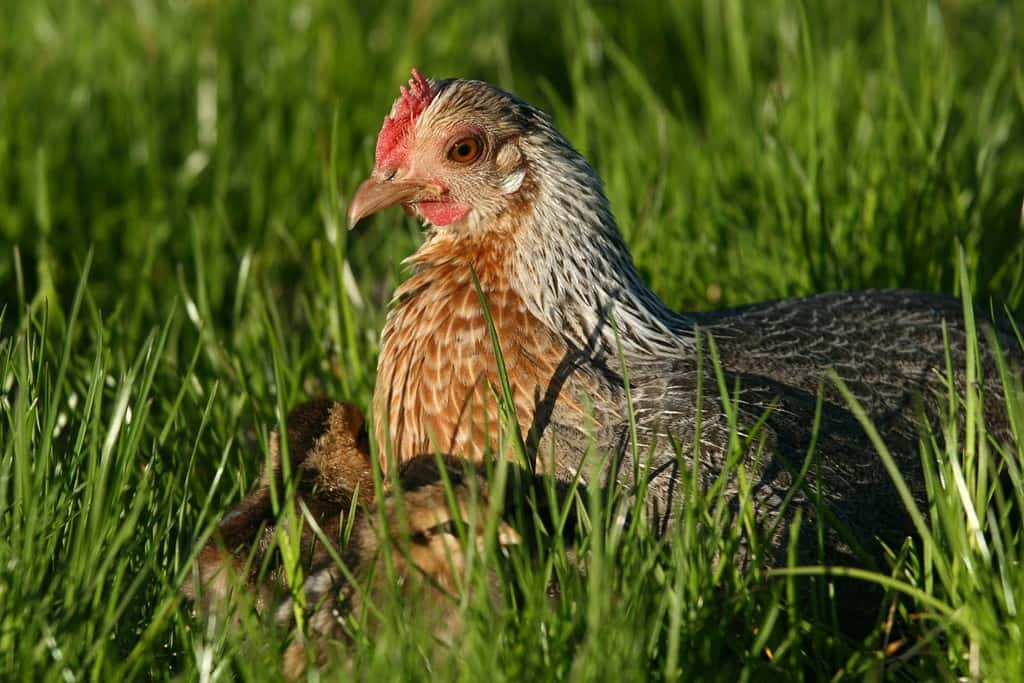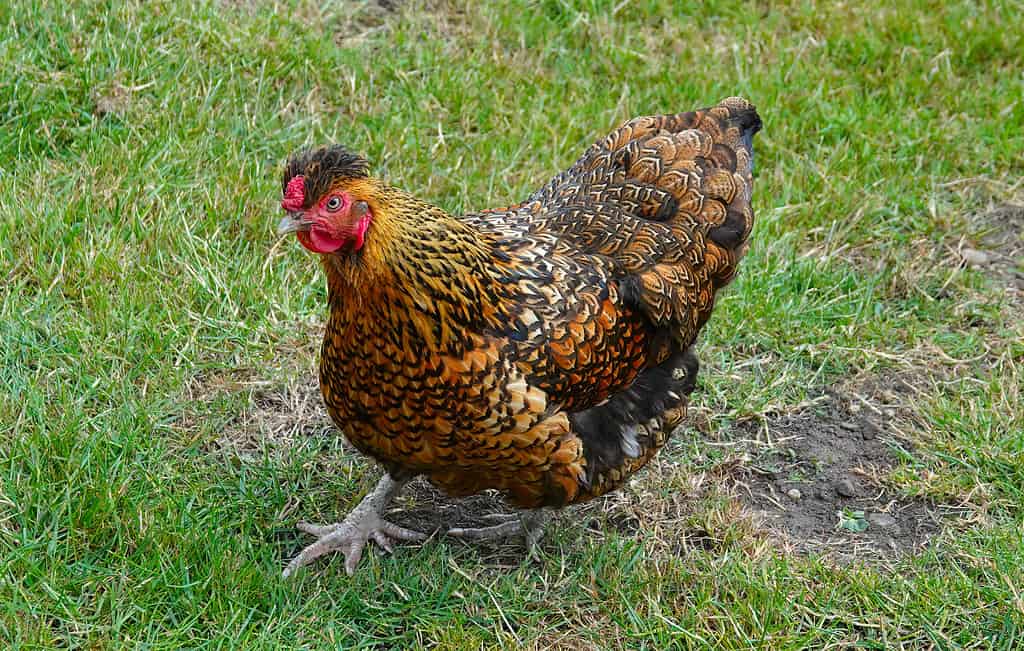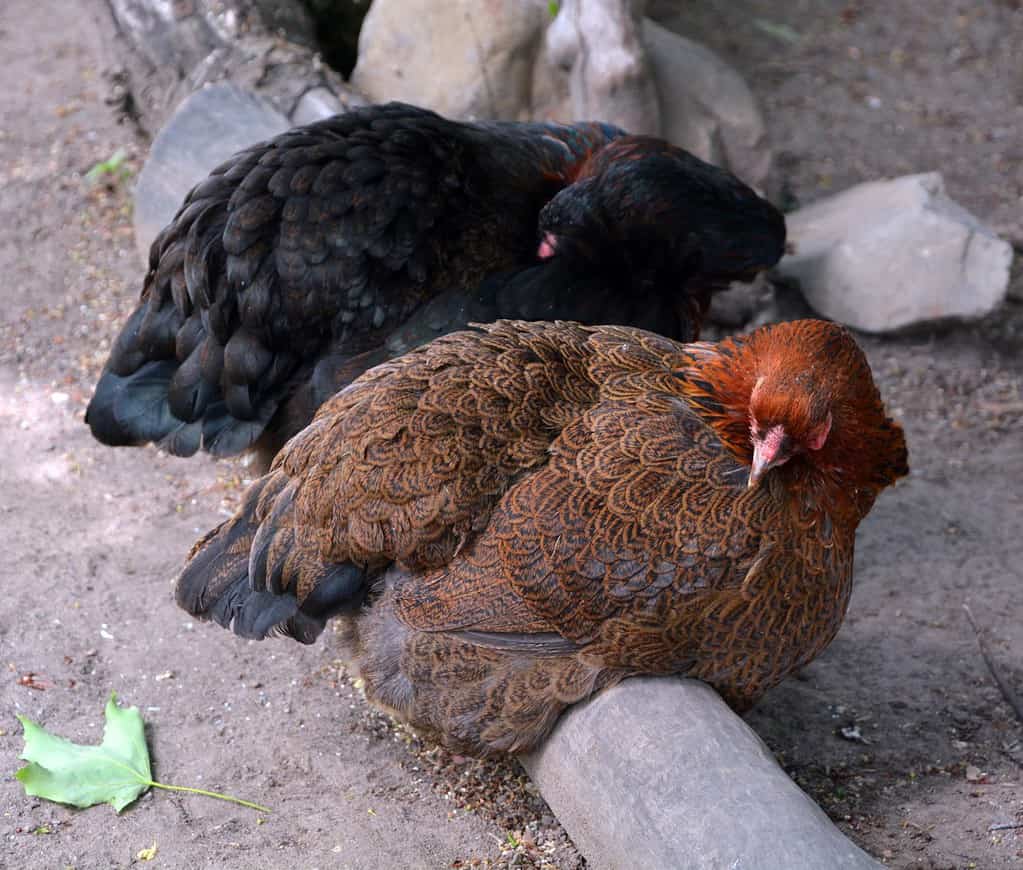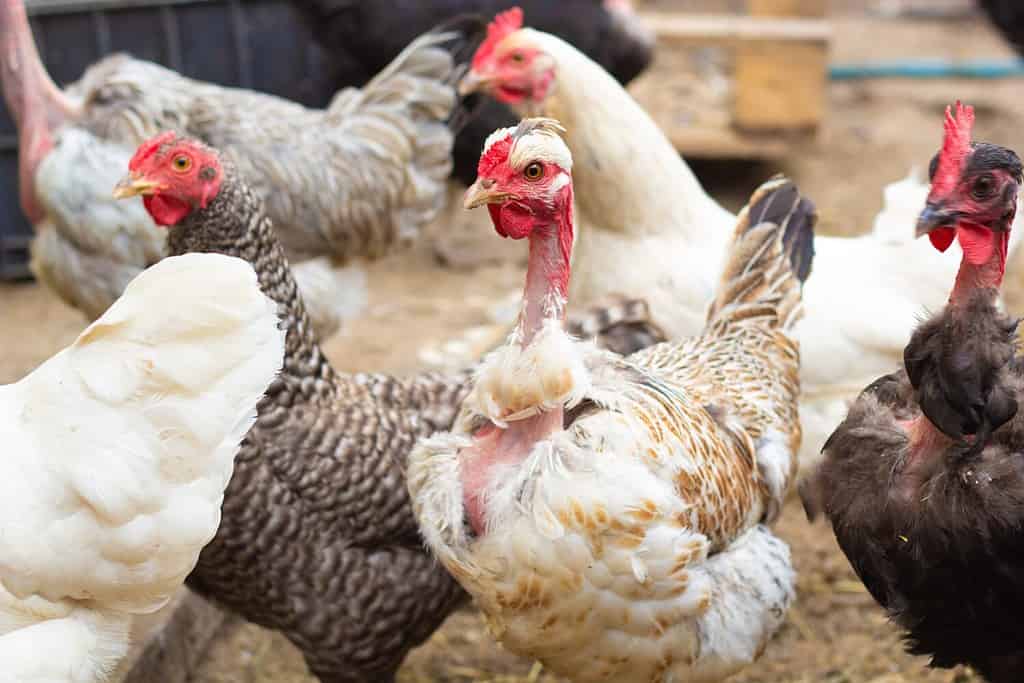Many people dream about having a flock of chickens to take care of. Folks think about the companionship of the animals as well as their meat, eggs, and feathers. Many put their desire to care for a flock aside because they do not want to move out of the city. But humans can raise chickens almost anywhere, even in the city.
Before we dive into 11 tips for raising chickens in a city, we must acknowledge that raising chickens is unfortunately a privilege. Since colonizers stole and divided up much of the land in the world, their ancestors are the majority of those who can afford raising chickens in urban areas. If you can afford to raise chickens in your backyard, critically think about your privilege and how you need to step outside of your privilege bubble and give back. Now, let’s get into city living with a folk of hens.
1. Check Your Local Laws

Old English Game hens come in a wide variety of color patterns.
©Michael Woodruff/Shutterstock.com
The first thing you need to do before getting chickens is researching the laws in your area. You’ll want to research city, county, and state laws. Usually, a county will have ordinances limiting how many chickens you can have in the cities. They will also dictate how large your yard needs to be for the animals to be comfortable. Plus, other laws determine how far your coop must be from your fence line. If you don’t do your research, you could end up with a heavy fine and the loss of the hens.
2. Find a Specialty Vet

Chickens need to live in groups.
©undefined undefined/ via Getty Images
You cannot take your hens to any vet. You need to find one who specializes in avian life, with a particular focus on chickens. While most cities and towns will have a chicken vet nearby, large urban areas might not. If you need to drive over an hour to handle emergencies, you probably shouldn’t get chickens. Plus, make sure you trust the individual and that they are reliable. If they’re close by but incompetent, getting hens is not worth it.
3. Do You Have Enough Space?

Chickens need more space than people believe.
©Nigel Harris/ via Getty Images
So, you’ve checked with the applicable laws and that there is a reliable, competent vet nearby. Now it’s time to look at your space. Do you have enough yard space to take good care of a flock? Remember, these animals are fully dependent on you to survive and thrive. You shouldn’t treat them as products or livestock for you to use but instead as equals whose wellbeing you are responsible for.
Chickens need two to three square feet per hen in the coop and eight to ten square feet per hen in the run. You’ll also want to measure your yard to see if you have room for both. Taking these measurements will also help you determine the size of flock you can keep. Keep your coop closer to your home than to the home of your neighbors. This way the noise won’t bother them, and the animals won’t ruin their garden.
4. Keep a Small Flock

Do not try to force egg productivity, chickens will lay plenty.
©emer1940/ via Getty Images
For city life, a small flock is the best way to go. If you’re main goal is to get eggs from your hens, you don’t need a large number of animals. Each hen gives about four to five eggs a week. So, if you have a flock of four, you’ll get approximately 16 to 24 eggs every week. You can feed multiple people with that many eggs, and you’ll probably have extras to give to your neighbors, houseless and struggling folks, and loved ones.
If you have a smaller flock, you’ll need less space, money, and they’ll be quieter. You might want to go bigger if your city doesn’t have ordinances, but small and steady always wins the race.
5. Do Not Get Roosters

Roosters make more noise than hens.
©fotograficu/Shutterstock.com
Another tip for raising chickens in the city is not to get roosters. Most cities make it illegal to keep roosters because of their loud and aggressive natures. They also do not lay eggs and might disturb your neighbors. Unless you want to breed your chickens, you don’t need a rooster. And if you do, it’ll be better done outside of the city.
6. Choose a Quiet Breed

Certain types of chickens are not as vocal as others.
©meunierd/Shutterstock.com
For many city dwellers who want chickens, a top fear is the animals annoying the neighbors and causing trouble. While roosters are usually louder, hens do create a lot of noise themselves. They squawk often and loudly sort out their pecking order. While you’ll never be able to take all the noise out of the animals, you can get breeds that are quieter.
You can choose between the Barred Plymouth Rock, Orpington, Brahma, and Cochin breeds. These quieter animals are sweet-natured and don’t tend to fight often. In fact, your neighbors might never notice them.
7. Talk to Your Neighbors

Chickens eat seeds, fruits, insects, and berries.
©Hanneke Wetzer/Shutterstock.com
Another way to get over the fear of chickens annoying your neighbors is to have conversations. If you share fences, it is especially important to loop them in. Tell them about your plan and include things like flock size, coop location, and how you’ll keep the animals in your space. This honesty will help your neighbors have more trust in you and might make them excited at the prospect of having chickens nearby. It might also inspire them to care for a flock of their own.
8. Make Your Space Predator Proof

Naked neck chickens have bare necks and come in a variety of colors, including black, buff, red, and white.
©Jane Nadezhina/Shutterstock.com
While you probably won’t see larger predators in the city, you still need to worry about other creatures killing and eating your animals. Sometimes wolves or coyotes get pushed into cities by shrinking habitats and the climate crisis. Plus, you have to worry about raccoons, rats, possums, hawks, and outdoor pets. Stray dogs and cats often kill and eat chickens because they do not have consistent food sources.
You’ll need to predator-proof the chicken run and coop, plus the fences around the yard. Double-check that no creature will be able to dig under the fence to get the hens. Make sure that vents, windows, coop doors, and floorboard holes are secure.
9. Give Them Free-Range Time

Chickens are omnivores.
©Jpr03/iStock via Getty Images
For urban chicken hopefuls, free ranging might seem like a far-fetched idea. But that’s why you measured the yard and outdoor space earlier. You should give the chickens at least an hour or two per day to roam around. Sit outside with them to make sure that they don’t hop the fence or fall prey to another animal. The time adds a richness to the eggs and your yard.
If you truly cannot free range your chickens for a period of time every day, you probably shouldn’t get chickens. Alternatively, you can plant a chicken garden in your run. This will add variety to their diet and attract bugs for them to munch on.
10. Clean Every Day

A typical clutch size for chickens is two eggs.
©Cynthia Farmer/Shutterstock.com
Chickens are quite messy and smelly animals, and this could be off-putting to neighbors and the community. You might grow used to the smell, but you definitely want to be mindful of others. Plus, chickens poop a lot and are not discriminatory about location. Keep their coop and run clean so that smells do not linger.
11. Keep Their Waste for Fertilizer

Factory farming tortures chickens and people around the world.
©Guy J. Sagi/Shutterstock.com
While most people think about chickens for their companionship, meat, and eggs, they are also great fertilizers. As previously mentioned, they are not picky about where they poop. That is great for you if you garden, because their poop is amazing natural fertilizer. Plus, you can offer some to your neighbors if they also garden. You can also use apps or go to the local farmers market to see if anyone wants your manure for compost.
Summary of 11 Tips for Raising Chickens in a City
| # | Tip |
|---|---|
| 1 | Check Your Local Laws |
| 2 | Find a Specialty Vet |
| 3 | Do You Have Enough Space? |
| 4 | Keep a Small Flock |
| 5 | Do Not Get Roosters |
| 6 | Choose a Quiet Breed |
| 7 | Talk to Your Neighbors |
| 8 | Make Your Space Predator Proof |
| 9 | Give Them Free-Range Time |
| 10 | Clean Every Day |
| 11 | Keep Their Waste for Fertilizer |
The photo featured at the top of this post is © Elizabeth Casanova/Shutterstock.com
Thank you for reading! Have some feedback for us? Contact the AZ Animals editorial team.






